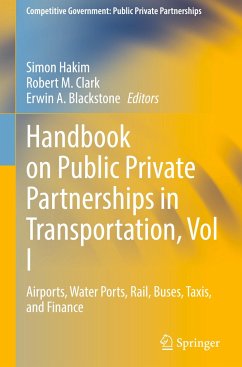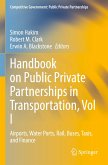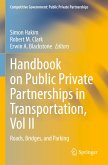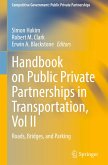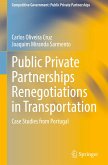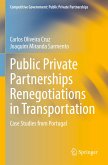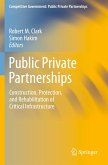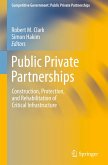Handbook on Public Private Partnerships in Transportation, Vol I
Airports, Water Ports, Rail, Buses, Taxis, and Finance
Herausgegeben:Hakim, Simon; Clark, Robert M.; Blackstone, Erwin A.
Handbook on Public Private Partnerships in Transportation, Vol I
Airports, Water Ports, Rail, Buses, Taxis, and Finance
Herausgegeben:Hakim, Simon; Clark, Robert M.; Blackstone, Erwin A.
- Gebundenes Buch
- Merkliste
- Auf die Merkliste
- Bewerten Bewerten
- Teilen
- Produkt teilen
- Produkterinnerung
- Produkterinnerung
This book discusses the role of public-private partnerships (PPPs) in global transportation infrastructure. Seen as a way to provide vital services in an era of shrinking government budgets, public-private partnerships have become an increasingly important part of travel infrastructure worldwide. This book describes and analyzes the structure of various models of PPPs in various countries, evaluating their effectiveness, and drawing policy implications for future use. Written by leading international researchers and practitioners in the transportation field, each chapter is a case study on the…mehr
Andere Kunden interessierten sich auch für
![Handbook on Public Private Partnerships in Transportation, Vol I Handbook on Public Private Partnerships in Transportation, Vol I]() Handbook on Public Private Partnerships in Transportation, Vol I169,99 €
Handbook on Public Private Partnerships in Transportation, Vol I169,99 €![Handbook on Public Private Partnerships in Transportation, Vol II Handbook on Public Private Partnerships in Transportation, Vol II]() Handbook on Public Private Partnerships in Transportation, Vol II169,99 €
Handbook on Public Private Partnerships in Transportation, Vol II169,99 €![Handbook on Public Private Partnerships in Transportation, Vol II Handbook on Public Private Partnerships in Transportation, Vol II]() Handbook on Public Private Partnerships in Transportation, Vol II235,39 €
Handbook on Public Private Partnerships in Transportation, Vol II235,39 €![Public Private Partnerships Renegotiations in Transportation Public Private Partnerships Renegotiations in Transportation]() Carlos Oliveira CruzPublic Private Partnerships Renegotiations in Transportation93,99 €
Carlos Oliveira CruzPublic Private Partnerships Renegotiations in Transportation93,99 €![Public Private Partnerships Renegotiations in Transportation Public Private Partnerships Renegotiations in Transportation]() Carlos Oliveira CruzPublic Private Partnerships Renegotiations in Transportation93,99 €
Carlos Oliveira CruzPublic Private Partnerships Renegotiations in Transportation93,99 €![Public Private Partnerships Public Private Partnerships]() Public Private Partnerships116,99 €
Public Private Partnerships116,99 €![Public Private Partnerships Public Private Partnerships]() Public Private Partnerships116,99 €
Public Private Partnerships116,99 €-
-
-
This book discusses the role of public-private partnerships (PPPs) in global transportation infrastructure. Seen as a way to provide vital services in an era of shrinking government budgets, public-private partnerships have become an increasingly important part of travel infrastructure worldwide. This book describes and analyzes the structure of various models of PPPs in various countries, evaluating their effectiveness, and drawing policy implications for future use. Written by leading international researchers and practitioners in the transportation field, each chapter is a case study on the adoption, implementation, and outcome of transportation services in different municipalities. Taken together, these diverse case studies provide an integrated framework for evaluating and using PPPs. Providing rigorous empirical analysis of PPPs in transportation, this volume will be of interest to researchers in public administration, political science, and economics as well as practitioners andpolicymakers involved in establishing and monitoring PPPs in transportation.
Produktdetails
- Produktdetails
- Competitive Government: Public Private Partnerships
- Verlag: Springer / Springer International Publishing / Springer, Berlin
- Artikelnr. des Verlages: 978-3-030-83483-8
- 1st edition 2022
- Seitenzahl: 360
- Erscheinungstermin: 5. Januar 2022
- Englisch
- Abmessung: 241mm x 160mm x 25mm
- Gewicht: 705g
- ISBN-13: 9783030834838
- ISBN-10: 3030834832
- Artikelnr.: 62174590
- Herstellerkennzeichnung Die Herstellerinformationen sind derzeit nicht verfügbar.
- Competitive Government: Public Private Partnerships
- Verlag: Springer / Springer International Publishing / Springer, Berlin
- Artikelnr. des Verlages: 978-3-030-83483-8
- 1st edition 2022
- Seitenzahl: 360
- Erscheinungstermin: 5. Januar 2022
- Englisch
- Abmessung: 241mm x 160mm x 25mm
- Gewicht: 705g
- ISBN-13: 9783030834838
- ISBN-10: 3030834832
- Artikelnr.: 62174590
- Herstellerkennzeichnung Die Herstellerinformationen sind derzeit nicht verfügbar.
Simon Hakim is professor of economics and the director of the Center for Competitive Government at Temple University, US. He holds M.A and Ph.D. degrees in Regional Science from the University of Pennsylvania. He also earned a M.Sc. degree in City and Regional Planning from the Technion, Israel Institute of Technology and a B.A. in Economics at Hebrew University in Jerusalem. His special areas of research and teaching are privatization and Public-Private-Partnerships, economics of crime and security, private/public police, and homeland security. Dr. Hakim has published sixty-seven scientific articles in leading economic, criminal justice, security, and public policy journals. He has written over forty professional articles and written/edited nineteen books. Dr. Hakim has conducted several funded research and consulting projects on PPP, security, and public finance issues for the U.S. Departments of Justice and Labor, National Institute of Justice, Volunteers of America,the Commonwealth Foundation, the Independent Institute, the Alarm Industry Research and Education Foundation, cities like Philadelphia, Newark, and New-Castle County, DE, the Philadelphia International Airport, ADT Security, Vector Security, the private corrections industry, law firms, and other leading security companies. Robert M. Clark is currently an independent consultant in environmental engineering and public health. He is an Adjunct Professor in Civil and Environmental Engineering at the University of Cincinnati, US and was a member of the National Research Council's Committee on ''Public Water Distribution Systems: Assessing and Reducing Risks.'' As a consultant, Dr. Clark's work includes studies on homeland security and protection of critical infrastructure in collaboration with Sandia National Laboratories, the US Environmental Protection Agency (USEPA), Rutgers University (Newark Campus), and the University of Cincinnati, among others. He served as an environmental engineer in the U.S. Public Health Service and the U.S. EPA from 1961 to August 2002 and was Director of the USEPA's Water Supply and Water Resources Division (WSWRD) for 14 years (1985-1999). In 1999 he was appointed to a Senior Expert Position in the USEPA with the title Senior Research Engineering Advisor and retired from the USEPA in August of 2002. Dr. Clark was a member of USEPA's Water Protection Task Force and served as USEPA's liaison for homeland security research. Dr. Clark has published over 400 papers and 6 books and has been professionally active in several organizations where he served in numerous leadership positions. He is a lifetime member of both the American Water Works Association (AWWA) and the American Society of Civil Engineers (ASCE). Dr. Clark is recognized both nationally and internationally and has received numerous awards for his work. Dr. Clark holds B.S. degrees in Civil Engineering from Oregon State University (1960), and in Mathematics from Portland State University (1961), M.S. degrees in Mathematics from Xavier University (1964), and Civil Engineering from Cornell University (1968) and a Ph.D. in Environmental Engineering from the University of Cincinnati (1976). He is a registered engineer in the State of Ohio. Erwin A. Blackstone has taught economics in the US for over forty years. Dr. Blackstone holds an A.B. in economics from Syracuse University and a Ph.D. in economics from the University of Michigan. He is a member of Phi Beta Kappa. Prior to his current appointment at Temple, Dr. Blackstone taught at Dartmouth College and Cornell University. His research areas include the economics of industrial organization, health economics, and privatization. He has published on a variety of industrial organization topics including mergers, dominance, reciprocal buying, collusion, and damages. He has published articles on a wide variety of health issues including physicians, hospitals, and pharmaceuticals. In privatization he has published articles on such topics as private police and response to burglar alarms. His publications include over fifty articles in major economics and public policy journals, chapters in books, and a book on the electronic security industry. Dr. Blackstone has taught courses from the introductory to the Ph.D. level. In 1976, he received the Clark Award for distinguished teaching at Cornell and at Temple, the Andrisani-Frank Award for Excellence in teaching in 2001 and the Musser Excellence in Leadership Award for Teaching in 2006.
Chapter 1. Public Private Partnerships in Transportation: Airports, Water Ports, Rail, Buses, and Taxis- AN OVERVIEW.- Chapter 2. Evaluating The Viability of The Ghana Airport Cargo Centre as Publica-Private Partnership Project.- Chapter 3. The role of individual actors in public-private partnership (PPP) projects: Insights from Madinah Airport in Saudi Arabia.- Chapter 4. Models, Expectations, And Reality In Airport Public Private Partnerships.- Chapter 5. Airport Privatization in the United States.- Chapter 6. Legal Impediments to Airport P3s in the United States.- Chapter 7. Public-Private Partnerships in Port Areas: Lessons Learned from Case Studies in Antwerp and Rotterdam.- Chapter 8. Seaport PPPs in the EU: Policy, Regulatory and Contractual Issues.- Chapter 9. Sustainable Strategies for Mass Rapid Transit PPPs.- Chapter 10. Rational Inattention in Non-Profit Public-Private Partnerships: The Las Vegas Monorail Bankruptcy Case.- Chapter 11. Public -Private Partnerships inDenver, CO: Analysis of the Role of PPPs in the Financing and Construction of Transportation Infrastructure in the USA.- Chapter 12. Governance of Public Private Partnerships: Lessons from the Italian Experience in Transportation Projects.- Chapter 13. Developing Urban Rail Using Public Private Partnership - A Case Study of the Gold Coast Light Rail Project.- Chapter 14. For Hire Vehicle Regulation, misunderstanding, mismatch, control and capture: the case of Vehicles for Hire and PPP.- Chapter 15. Using History to Develop Future Regulation of TNCs and Autonomous Taxis.- Chapter 16. Distinguishing Between Demand-Risk And Availability-Payment Public-Private Partnerships.
Chapter 1. Public Private Partnerships in Transportation: Airports, Water Ports, Rail, Buses, and Taxis- AN OVERVIEW.- Chapter 2. Evaluating The Viability of The Ghana Airport Cargo Centre as Publica-Private Partnership Project.- Chapter 3. The role of individual actors in public-private partnership (PPP) projects: Insights from Madinah Airport in Saudi Arabia.- Chapter 4. Models, Expectations, And Reality In Airport Public Private Partnerships.- Chapter 5. Airport Privatization in the United States.- Chapter 6. Legal Impediments to Airport P3s in the United States.- Chapter 7. Public-Private Partnerships in Port Areas: Lessons Learned from Case Studies in Antwerp and Rotterdam.- Chapter 8. Seaport PPPs in the EU: Policy, Regulatory and Contractual Issues.- Chapter 9. Sustainable Strategies for Mass Rapid Transit PPPs.- Chapter 10. Rational Inattention in Non-Profit Public-Private Partnerships: The Las Vegas Monorail Bankruptcy Case.- Chapter 11. Public -Private Partnerships inDenver, CO: Analysis of the Role of PPPs in the Financing and Construction of Transportation Infrastructure in the USA.- Chapter 12. Governance of Public Private Partnerships: Lessons from the Italian Experience in Transportation Projects.- Chapter 13. Developing Urban Rail Using Public Private Partnership - A Case Study of the Gold Coast Light Rail Project.- Chapter 14. For Hire Vehicle Regulation, misunderstanding, mismatch, control and capture: the case of Vehicles for Hire and PPP.- Chapter 15. Using History to Develop Future Regulation of TNCs and Autonomous Taxis.- Chapter 16. Distinguishing Between Demand-Risk And Availability-Payment Public-Private Partnerships.

